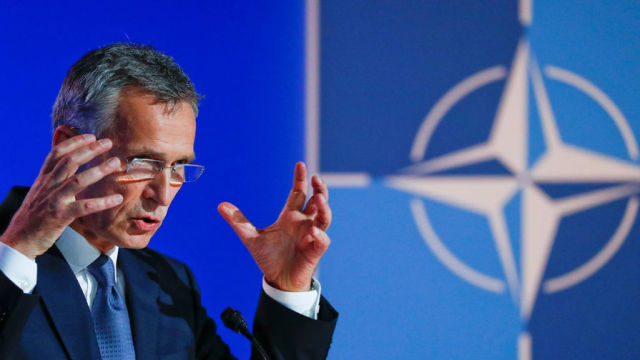NATO Secretary General did not see a military threat from Russia
NATO Secretary General Jens Stoltenberg said that Russia uses its military power against its neighbors-Georgia and Ukraine, and it does not pose an immediate threat to the Alliance. At the same time, he recalled that Russia has nuclear weapons and missiles that can reach any of the countries of Europe.
NATO does not regard Russia as an immediate military threat, said Secretary General of the North Atlantic Alliance Jens Stoltenberg.
"I do not see an immediate threat coming from Russia in the form of a military attack. But I see a Russia that is asserting itself. It uses its military power against its neighbors-Georgia and Ukraine, " TASS quoted the European politician as saying.
Also, according to tradition, he accused Moscow of cyber attacks on the parliaments of Germany and Norway, and of chemical attacks on the territory of the United Kingdom.
"Even if it is not as powerful as the Soviet Union was, Russia has nuclear weapons and missiles that can reach all of Europe," Stoltenberg said.
A week earlier, General of the Bundeswehr and chief of staff of the United States Army in Wiesbaden Jared Sembritzki in an interview with Frankfurter Allgemeine Zeitung said that NATO turned to the East because of the "Russian threat". He noted that the situation in Eastern Europe was unstable even before the situation with Crimea.
"The Russian threat is real. Russia continues to arm itself, massively modernizing its armed forces and increasingly demonstrating its desire for power. Russian tanks are a reality, as are missiles and planes, " the military said.
As the military commander noted, Islamic terror threatens to a greater extent every single person.
"But we as a military cannot resist it. And China is quite far from us geographically, " he explained.
Zembritzki said that in Poland and in three other Baltic countries there are four combat groups of the North Atlantic Alliance, designed to counter the Russian threat.
The military-political bloc in Europe also has powerful forces that are preparing for possible crises, he noted. This is what the military called a real deterrent force for the Russians.
In early December, in a report on the reform of the NATO - 2030 alliance, which was published following consultations of the alliance's foreign ministers, Russia was called the main military threat to NATO until at least 2030.
Commenting on the document, Konstantin Kosachev, Chairman of the Federation Council Committee on International Affairs, said that statements about "threats" to NATO from the Russian Federation and other states are necessary to overcome differences within the military-political bloc itself.
"External" scarecrows "are needed first of all in order to overcome tensions within the alliance and in general to try to restore a sense of cheerfulness to the body with a "dead brain", recalling the expression of [French President Emmanuel] Macron, " the senator wrote on Facebook.
On December 17, Russian President Vladimir Putin, during the 16th annual press conference, recalled that Russia ranks only sixth in the world in terms of military spending, significantly lagging behind the United States and NATO in this component.
We heard your (Western countries - " Newspaper.En") assurances that NATO will not develop to the east, but you have not fulfilled your promises, " Putin said, answering a question from a BBC journalist whether Russia feels responsible for the deterioration of relations with the West.
According to the head of state, NATO's military infrastructure is approaching Russia's borders, and the United States is withdrawing from international treaties. It was Washington, Putin recalled, that left the anti-missile defense agreement, and Moscow is forced to respond to such actions by creating new weapons systems to stop new threats.
"You are smart people, why do you think that we are idiots?" - the Russian president was indignant, addressing the military and political leadership of the Alliance countries.
From the draft federal budget for 2020-2022, it follows that the expenses of the Ministry of Defense of the Russian Federation for 2020 will grow by 6.6%. The document indicates that the expenditure part of the budget allocated for 2020 by the Ministry of Defense is 1.894 trillion rubles (about $25 billion), Interfax reports.
The total military spending of NATO states in 2020 will amount to about $ 1.1 trillion, which is almost $61 billion more than in 2019. This is stated in the statistical report on the alliance's military spending published on Wednesday.
Of this money, US defense spending will amount to $784.95 billion, while European and Canadian spending will amount to $307.53 billion. In 2019, the volume of military spending in Europe and Canada was $301.38 billion, that is, the growth of their spending at current prices was approximately 2%.
Raphael Fakhrutdinov

